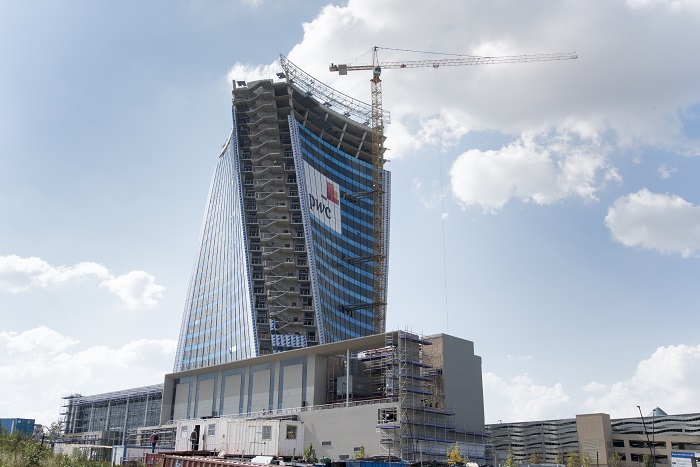The South African Institution of Civil Engineering (SAICE) recognized Arup with a Highly Commended Award in the Structural Engineering Project Division for their work on the PwC Tower, at the Most Outstanding Project Awards ceremony hosted by SAICE, Johannesburg Branch.
The design
“Our unique contribution to the PwC Tower located in Midrand, north of Johannesburg, was to make the complex, spiralling tower design buildable and economical. This was achieved by careful thinking on how best to balance loads and then refined through the use of parametric modelling.
Also read: Hayer Bishan Singh and Sons Limited: Civil and Structural Engineering Contractors
Our advanced parametric modelling software and systems enabled us to make quick assessments of a number of different structural and façade geometries – thereby enabling us to offer optimised and integrated solutions,” said associate director Richard Lawson at Arup and project manager for the PwC Tower.
Also read: Kitololo Consultants: Quality professional services in civil and structural engineering
Lawson commented, “We at Arup are extremely proud to be part of the team that has created this iconic building. To receive the Highly Commended Award from SAICE for our role as structural engineers is an honour. I congratulate all members of the project team from Arup, as well as the members of the project’s professional team who we have worked with since the inception of this amazing construction”.
“We believe the key to the success of this award-winning development is the industry collaboration coupled with embracing technology that facilitates that collaboration”, Lawson concluded.
Also read: Vital Engineering’s ‘powerful’ project wins in many sectors
Structural engineering challenge
The biggest structural challenge is the spiralling form of the tower that caused the gravity loads to create a clockwise torsional load on the building. This is balanced by columns along the façade that counter that twist. Parametric modelling was used to quickly and effectively explore a number of design solutions to find one that best balanced these loads, whilst also taking into account the connection between the structure, façade, aesthetics and floor plan.
Tall building construction is relatively rare in South Africa. The core was constructed using slip forming. Internationally this construction method is relatively common for buildings over ten storeys, but until recently in South Africa, it has generally only been used for forming chimneys and cooling towers.
Also read: Membership Registration with Nigerian Institution of Structural Engineers
The façade also posed technical challenges. Alongside the development of the structural form, parametric modelling allowed for various façade solutions to be considered at the conceptual stage. It was decided to wrap flat glass around a twisting structure, and the optimisation of this included factors such as glass utilisation, aesthetic alignment with the structure and integration of blinds with a sloping, slanting façade.
Because the PwC façade is concave and twisting, concentrated solar reflections were identified as a risk. A purpose-built script was developed to assess intensities of solar reflections. It calculated the magnitude of the solar concentrations in the open areas surrounding the tower. It then tested feasible and practical solutions to mitigate the impact of the solar reflections.
About Arup
Arup is the creative force at the heart of many of the world’s most prominent projects in the built environment and across industry. From 92 offices in 40 countries our 12,000 planners, designers, engineers and consultants deliver innovative projects across the world with creativity and passion.
We have over 650 staff in Africa, of which over 200 are in Southern Africa. Through our unsurpassed technology and connectivity, we can call on the international expertise of our colleagues from across the globe at any time. We have worked on more than 20,000 projects and
developments in Africa including commercial buildings, mixed-use developments, airports, sports venues, bridges, highways, railways, industrial development zones, oil, gas and energy projects, hospitals, prisons, arts and cultural venues, science and technology parks, water and waste projects.
On these projects, we have provided or continue to provide multidisciplinary engineering, planning, project management, transaction advice and sustainability consulting services.

